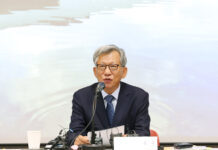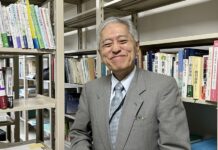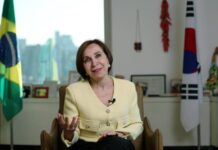Korea has transformed itself from an aid beneficiary to an aid provider. The country holds the indigenous, precious asset of having accomplished economic development, all while overcoming the difficulties of war and all within a relatively short period of time.
Many countries around the world are eyeing Korea’s experience in terms of economic development.
In order to share its knowledge and experiences in terms of economic development with developing economies around the world, Korea has been running the Knowledge Sharing Program (KSP) since 2004.
Since its launch with two partner countries, Vietnam and Uzbekistan, the KSP has expanded to include more than 50 countries from around the world.
Korea.net recently met with Yoon Dae Hee, head of the KSP and a chair professor at Gachon University, to learn more about the current state of the KSP and to hear his views about the future direction of Korea’s further economic development. Yoon believes that sharing Korea’s knowledge and experiences with developing countries is a rewarding job. He formerly served as minister at the Government Policy Coordination Office.
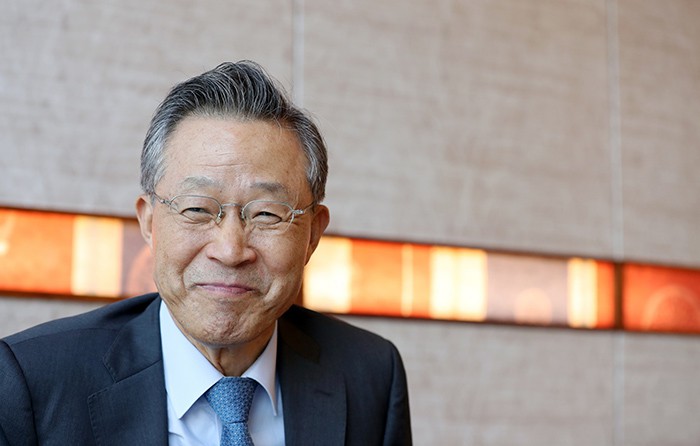
Yoon Dae Hee, head of the KSP, actively works for the program with many countries from around the globe. He says that Korea has to pay back the help it received from the world, emphasizing the importance of the KSP.
– What motivated you to get involved with the KSP after retiring from public service?
After my retirement in 2008, I taught at a university. Earlier, in 2009, one of my seniors called me and asked if I could go to Ghana to represent the KSP, which began work there a year earlier. He told me that the Korea delegation needed someone who had a background as a senior economics official and who was fluent in English. At that time, there weren’t enough candidates. So after the phone conversation, I headed to the National Medical Center to receive the required shots for traveling to West Africa and packed my bags.
After arriving in Ghana, I hosted a senior policy dialogue with high-profile officials there. I delivered a presentation about a mid- to long-term economic plan, but they weren’t too impressed. They were all elite officials with academic backgrounds from prestigious universities, like Oxford or Cambridge. Besides, they already had policy advice from the International Monetary Fund and the World Bank.
I told them to regard Korea’s presentation as a reference point, and proposed they talk openly about anything they might find interesting about the Korean economy. Their first question was about the way in which Korea got its initial financing. This is because they were unable to implement development plans due to a lack of capital, even though they already knew where they wanted to go.
I recalled my own experience when I worked for the Economic Planning Board in the mid-1970s. I told them that Korea was poor and needed to attract a lot of domestic and foreign capital. I explained to them about the various methods the Korean government used at that time: encouraging citizens to save money in domestic banks by pushing elementary school students to open bank accounts, appointing and awarding celebrities or movie stars who have good savings records, introducing a negative interest rate by setting up higher deposit interest rates than loan interest rates, and attracting foreign investment by introducing foreign capital inducements and tax benefits to form foreigner-only industrial complexes. This changed the mood in the room, and the Ghana officials continued to ask more detailed questions. Thanks to the KSP and Ghana, we were able to expand the program to more African countries, and to countries in Central and South America, too.
I also cherish my relationship with current Vietnamese Prime Minister Nguyen Xuan Phuc. He’s strongly interested in Korea. I first met him in 2007 at a ministerial meeting. Since then, we’ve kept in touch, especially when we visit each other’s countries. He always asked me about Korea’s experiences. After he became prime minister, I met him this past August in Vietnam. Vietnam was filled with a festive mood because it had won its first-ever gold medal at the Olympics. The gold medalist was a shooter who trained with a Korean coach.
When I met Prime Minister Nguyen, I celebrated Vietnam’s victory at the Rio Olympics. He responded by saying, “This could be one of the iconic successful results if Korea and Vietnam were to cooperate together.”
In the past, Vietnam has participated in the KSP every year, ever since the program commenced in 2004. Currently, Korea and Vietnam have been carrying out about 50 projects under the KSP. If we look back on history, such as Korea’s participation in the Vietnam War, the diplomatic relationship could have been worse. However, it transformed itself into such a desirable one, which I find meaningful, and I’m deeply moved by the KSP’s projects with Vietnam.
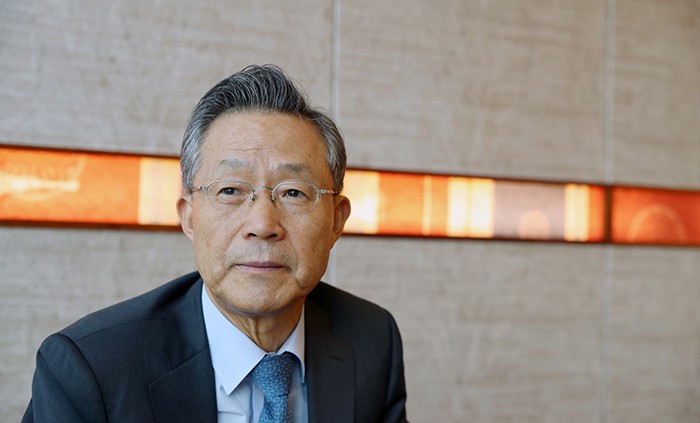
Yoon Dae Hee, head of the KSP, says that many countries in Asia, Africa and Central and South America have shown great interest in sharing Korea’s economic development experience. He says their interest has shifted to science and high-tech, from the existing sectors of economics and finance.
– Since the launch of the KSP in 2004, it currently works with more than 50 countries. The more active members are Vietnam, Myanmar and Laos. What’s the reason for their active participation in the program? In what areas do they take an interest and wish to share knowhow with Korea?
In the past, many of them focused on sharing knowledge about general economics. However, this has changed recently. In the case of Vietnam, Laos, Cambodia and Ghana, for example, they showed a strong interest in the economic and financial systems, as shown in the Korea Eximbank, KOTRA’s trade-investment promotion system, and the automated computing system used by the Korea Stock Exchange. These countries have since introduced similar systems through policy consultations with Korea.
These days, they also take an interest in science and technology. They’re interested in forming industrial clusters, such as those in Gumi or Siheung, where human resources, capital and firms are interlinked together. They’re also interested in “technology finance corporations,” a system to foster small- and medium-sized enterprises.
Central and South America is also highly interested in learning about Korea’s knowledge, especially in terms of science and technology. Colombia and Costa Rica, for instance, are taking an interest in measures to develop their own science and technologies, such as forming special zones like the Daedeok Science Town.
– Korea has been expanding cooperation with developing countries in order to share its knowledge and experiences in terms of economic development. What should Korea be careful about when carrying out such cooperation projects?
We should always be humble and share our successes, our failures and the trials and errors through which we went, all together as one. For example, Vietnam is a country that introduced many capitalist policies based on a socialist structure. The Vietnamese take pride in their country. Besides, Vietnam has developed a high social status for women, with expanded women’s rights, as we can see in the new speaker of the parliament that was elected earlier this year.
Another example is Ghana, the first KSP participant in Africa. That country used to follow the traditions of the U.K., as it was colonized by the U.K., and established a highly developed democracy.
Korea should not simply present its success stories to its neighbors without being aware of their uniqueness or well-established sectors in each participant.
We also need to consider the differences between today and the 1970s and 1980s when Korea underwent much of its economic development. Under the General Agreement on Tariffs and Trade (GATT), which later became the WTO, the world was much more generous to developing countries in those days than it is today. Korea benefited greatly from this, to be honest. Nowadays, however, we face more difficulties than in the past. China has placed itself as the single top destination in the manufacturing sector. We should never teach Korea’s success story without considering modern changes in the global economy.
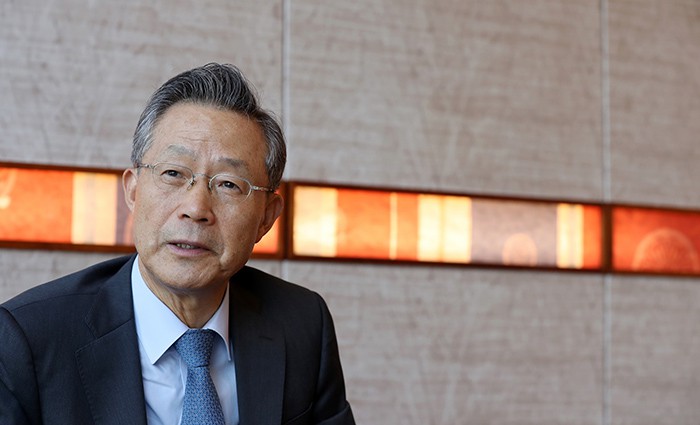
Yoon Dae Hee, head of the KSP, emphasizes that Korea needs to share its successes, failures and trials and errors, all together as one, with the other countries that take part in the KSP.
– You said the Korea-U.S. FTA was the most rewarding outcome of your service in public service. In what areas do you believe that free trade improved Korea’s international status? They say Korea’s exports will be reduced, while those of Japan will increase, when the Trans-Pacific Partnership (TPP) takes effect. What action should Korea take to effectively respond to this?
I believe the Korea-U.S. FTA (KORUS FTA) would never have been possible if we hadn’t signed the deal at that time. In fact, we underwent a lot of hardships, both in and outside, during the whole process of working out the deal. A total of 25 countries hoped to sign an FTA with the U.S. An FTA doesn’t solely focus on the business sector of the two countries. The KORUS FTA holds significance as it means that both Korea and the U.S. agree to match the business standards of each other.
Traditionally, the manufacturing sector has lead the Korean economy, but we’re currently witnessing thousands of jobs disappearing every year in that sector.
We don’t have enough service industry jobs where young people can hope to work, such as the medical, legal, accounting or design fields. To offer young people a “decent job,” Korea must concentrate on developing the service sector. Right now, it has many needed tasks to make improvements in that sector, especially if we look at the hospitality or restaurant industries. In the case of the U.S., on the contrary, the U.S. has some of the highest-quality service sector industries in the world, such as the education or medical fields, which is a good model for Korea.
In regard to the TPP, I believe Korea should hurry up and join. In the case of the clothes and fabric industry, leading Korean clothing companies are looking for ways to build factories in Vietnam in order to not suffer a loss because of the rules of origin that are part of the TPP. Vietnam has joined the TPP. Under the TPP’s rules of origin, raw materials traded within the region are considered “domestic,” and therefore are entitled to receive tariff benefits. If Korea doesn’t become a member of the TPP, its manufacturing sector will face a big challenge. As an agreed FTA can be renegotiated, I believe the TPP will also be renegotiated, and Korea should grab the chance to join. If this becomes the case, we’ll have to negotiate with each other TPP member country because Korea will not be a founding member. Still, Korea should join the partnership for many reasons.
– Korea transformed itself from an aid beneficiary into an aid donor within a relatively short period of time. Some people consider Korea to be an “advanced” economy, but others say the economy still has a long way to go.
The Korean economy is approaching the threshold of “advanced,” but hasn’t become one yet because we still have many tasks to accomplish. In 2005, when I attended the 60th special congress at the World Bank and the IMF, the then World Bank President Paul Wolfowitz quoted an economist’s thesis that compared Ghana and Korea and found many similarities, such as being a newly independent country, and having an agriculture-centered production structure and aid-based economy in the 1960s. The World Bank president said that the Korean economy is now on the threshold of becoming an “advanced” economy, and he praised Seoul’s economic development effort. Members of the Korean delegation, including former Prime Minister Han Duck-soo and myself, received a standing ovation.
However, Korea has many tasks ahead of it down the road to becoming an “advanced” economy. Many of them can be found in the systems and the overall mindset. Among them, I would pick labor relations. This issue is not a problem for just one side. It requires efforts from both sides — management and workers — working together. Managers must change their basic notion about what is a worker. However, it’s equally not desirable when a huge loss is endured due to the standoffs and wage negotiations. I hope both sides can learn their lessons and not repeat the same mistakes again.
– Despite the North Korean nuclear weapons issue and the worldwide economic slowdown, Standard & Poor’s has raised Korea’s sovereign credit rating from AA- to AA this year. Korea’s influx of foreign direct investment also hit a high recently. In order to overcome economic uncertainties and to maintain such economic momentum, what areas should Korea prioritize when setting its economic policies?
To be honest, we’re facing obstacles both in and outside the country. We have many issues to solve. Among them, I believe, Korea needs to carry out structural reform in many industries. Today, Korea’s conventional leading industries, such as shipping, shipbuilding and steel, are all experiencing hardships. We should conduct a bold structural reform in regard to zombie companies and indebted businesses that are highly dependent on government support and outstanding debt. Equally important tasks lie in structural reforms in four special sectors — the public sector, education, the labor market and the financial industry — as well as in solving problems related to household debt.
Other tasks include the lack of jobs and low household incomes. Low growth is another urgent issue. To solve these problems, we need to boost potential growth. As Korea’s economic volume has grown, comparing it to that of the past, it’s difficult to achieve development within a short period of time. In the end, we have to focus on improving productivity. To do so, we have to solve the other issues — a low birthrate and an aging society. What can we do if we run out of human resources, the main agent of economic activities? To boost potential growth, we need to have a changed mindset in terms of the government’s population policy. We need to set up policies to boost the birthrate and we need to consider introducing more innovative immigration policies, such as establishing a government body that focuses on immigration and bringing in human resources. I hope the government can actively attract highly talented human resources from abroad and ethnic Koreans from overseas, such as ethnic Korean Chinese or Russian citizens.
– The world is preparing for the fourth industrial revolution. The Korean government has also been emphasizing this paradigm change, and has enacted a “creative economy vision.” In which areas of the Korean economy do you think we need most urgently to have a paradigm shift?
I would say education and securing original technology. We don’t have enough native technology at the moment. It’s hard to expect technology development in this area in the short term, but I do know that many scientists are working hard to secure indigenous technologies.
There needs to be a paradigm shift in the education sector. As we noticed from the go match between AlphaGo and the go master Lee Sedol, we have to change our education system so that we can have more people like him: more elite, talented people, bubbling with creativity. This is impossible with today’s rigid educational system. We also need to have a paradigm shift in terms of the country’s immigration policy.
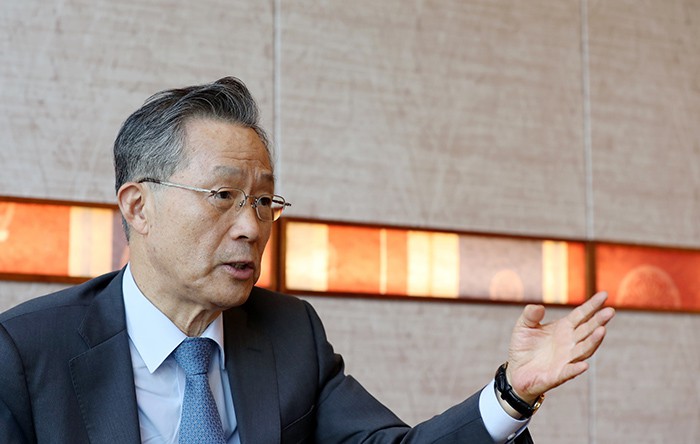
Yoon Dae Hee, head of the KSP, calls for more active participation from the government regarding responses to climate change, urging Korea to play a bridging role between industrialized economies and developing economies.
– Climate change is another global issue. No country is free from its effects. However, there’s a big difference between rich countries and developing economies when it comes to responses. In your view, what’s the best direction for Korea to take, between these two?
Korea needs to play a more active role between industrialized economies and developing economies. In the past, Korea received more than US 60 trillion in terms of aid from other countries. We must remember that Korea received help from the international community.
When I was in public service, I was in charge of the task of responding to climate change. It later became the framework for the “green growth policy direction” of the former Lee Myung-bak administration.
If we look at the series of climate change-related international conventions, from the Kyoto Protocol to the Paris agreement, the big difference lies in the inclusion of China and India in the latest Paris agreement, as both economies were exempt from earlier agreements. The Korean government pledged to reduce its green house gas emissions by 37 percent from the business-as-usual level by 2030, but I believe there’s still room for more active participation. To this aim, the government needs to persuade companies to cooperate in a more active manner.
– It seems that youth these days see society in a cynical light, and they concentrate solely only qualifications in order to obtain a job. As a scholar, elite public official and also as a senior citizen, what message or future direction in life do you hope to give youth today?
I honestly feel sorry for them and think they’re having a difficult time. Looking back, however, the older generations also went through similar times of darkness and hardship, like the division of the Korean Peninsula. Despite such difficulties, we did have opportunities, as the economy was growing. However, the 1997 Asian financial crisis changed many things. In the past, once people got a job, they regarded their job as lifetime employment. Since the Asian financial crisis, however, it was changed to employment in order to live.
I wish young people would choose to work at small- or medium-sized companies, and not solely apply for jobs at large conglomerate. I wish they would keep focusing on developing their personal capabilities and specialized knowledge so that they could grab the chance when it appears. Developing their personal capabilities means that they must concentrate on acquiring knowledge in a specialized field, and linguistic ability. In my view, linguistic ability can be achieved in a relatively short time. It’s too late if you only realize its importance later on. You need to take the time to focus on communication abilities.
Journalist and author Thomas Friedman said in his book “The World is Flat” that there are two ways to determine a country’s competitiveness: the number of people who can type on a keyboard skillfully, and the number of people who are fluent in English. This means fluency in English and computing skills can decide a person’s future.
Since the Kim Dae-jung administration, the Korean government has set itself the goal of turning the economy into a financial hub for Northeast Asia. However, that plan didn’t go anywhere because of a lack of such communication abilities. At the same time, Singapore and Hong Kong made it. English is not a “foreign” language. It’s the world’s language.
I hope young people can continue to work without getting exhausted or becoming cynical or falling behind. They can find opportunities overseas, like in the U.S. and in the Middle East. An excellent academic background is not any sort of requirement. I hope they can avoid frustration by living in the moment. I hope they can take the long-term view and just work hard.
By Yoon Sojung
Korea.net Staff Writer
Photos: Jeon Han Korea.net Photographer
arete@korea.kr


